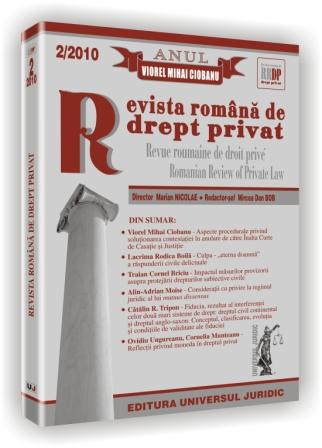Consideraþii cu privire la regimul juridic al lui mutuus dissensus
Considerations regarding the legal system of mutuus dissensus
Author(s): Moise Alin-AdrianSubject(s): Law, Constitution, Jurisprudence
Published by: Universul Juridic
Keywords: mutuus dissensus; legal system; return of benefits; tax on income from the transfer of real estate
Summary/Abstract: The Tax Code rules made us try to answer the question whether it is fair or not that, in case of a mutuus dissensus between the parties to a deed transferring title in real estate, the reverse transfer of title be subject to tax on income from the transfer of real estate from personal assets. Since the opportunity seemed appropriate, we also attempted to produce a series of general observations regarding the termination of a contract by agreement between all its parties, a more thorough examination than the one we are used to. Although the concept of conventional termination of a contract may suggest the idea of restoring the parties to their situation prior to the conclusion of the deed, according to the opinion we subscribe to, the new deed produces effects only for the future. However, we considered that a mutuus dissensus might have retroactive effects based on a defeasance clause and we emphasized the way in which this cause of contractual ineffectiveness is delimited from other such causes. Taking into consideration the presumed will of the parties, one can easily arrive at the solution according to which, in case of contracts transferring rights, their termination by consensus usually involves a new transfer of this type, which will require compliance with the legal advertising rules. Also, the symmetry of forms will condition, when required, the validity of a conventional termination by the authentic form or the meeting of requirements for authorization of the prime contract, when they are still required on the termination date under the law. Contrary to what the doctrine sometimes says, we believe that a mutuus dissensus is an unnamed contract and not a contract that is similar to the terminated contract, but in reverse direction, and this is true, first of all, due to the concept of cause of the civil legal act. As regards the impossibility of conventional revocation in case of contracts carried out, backed by the supporters of the reverse contract thesis, we tried to show that a contract can be considered entirely carried out only in a much smaller number of cases than those existing at a first glance. In our opinion, a mutuus dissensus of a contract transferring title should not essentially involve the return of benefits initially provided by the parties, if this is no longer possible, and a restoration of the previous situation by equivalent can be accepted. In the end, we tried to explain why a conventional revocation of a contract transferring or creating rights in immovable property should not be subject to taxation but, no matter the solution preferred, it seems mandatory to us – for removing certain doubts related to an important segment of the notary activity, which should not be unclear at all – that the lawmaker should explicitly stipulate de lege ferenda the solutions required in this respect.
Journal: Revista Română de Drept Privat
- Issue Year: 2010
- Issue No: 02
- Page Range: 85-120
- Page Count: 36
- Language: Romanian
- Content File-PDF

